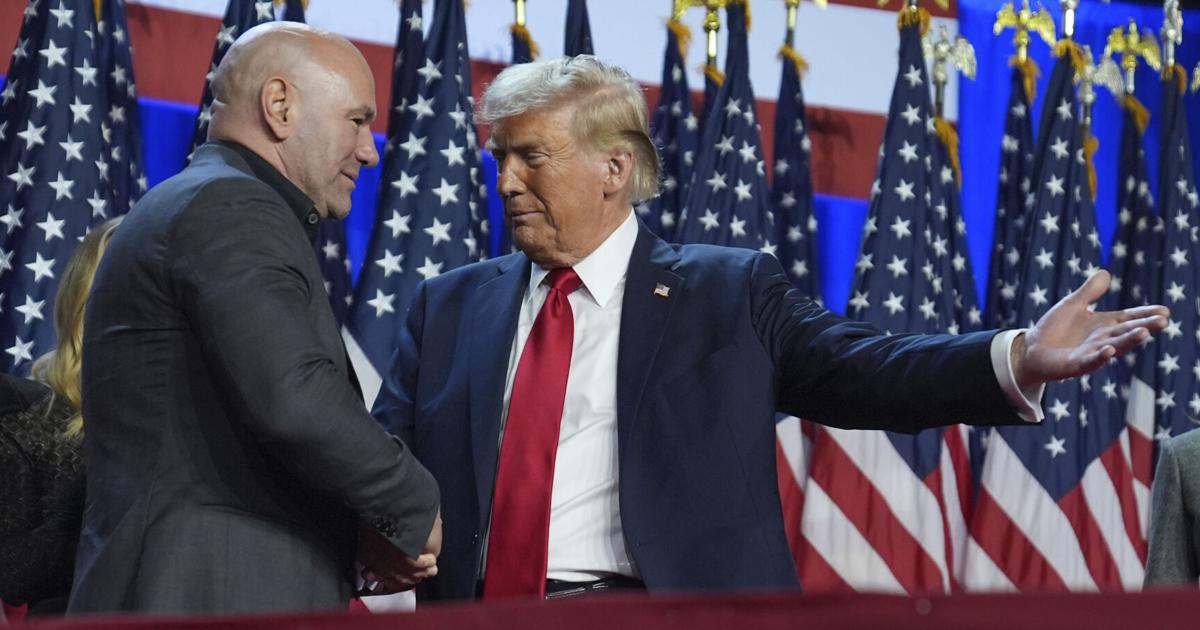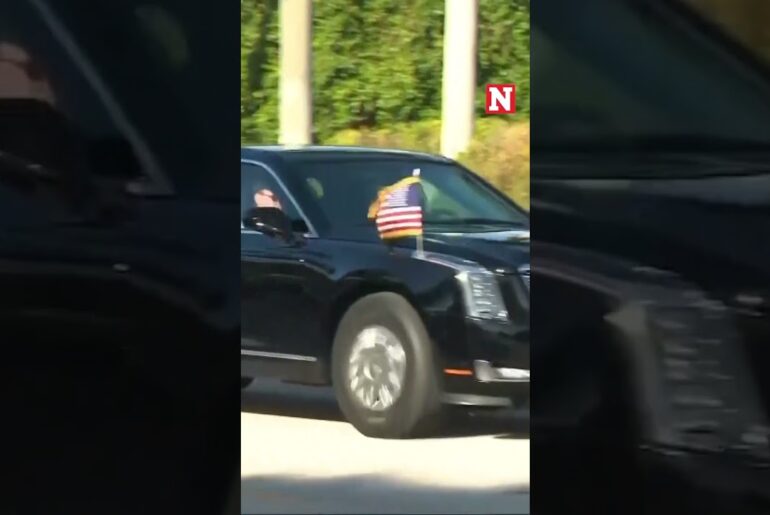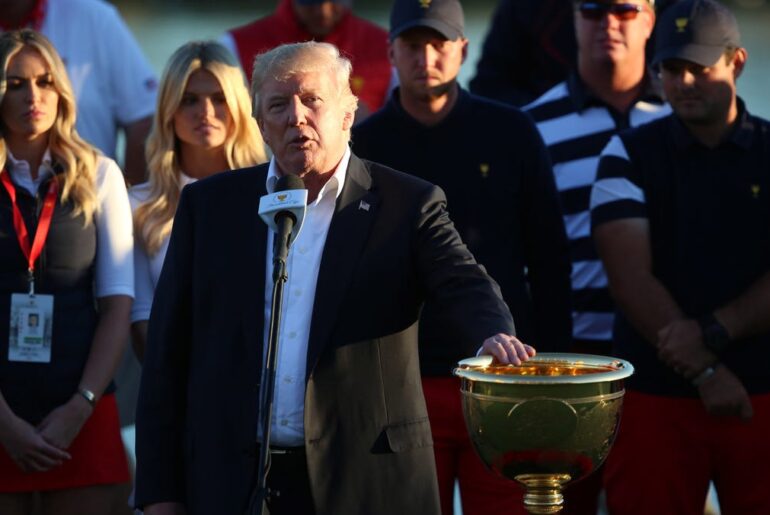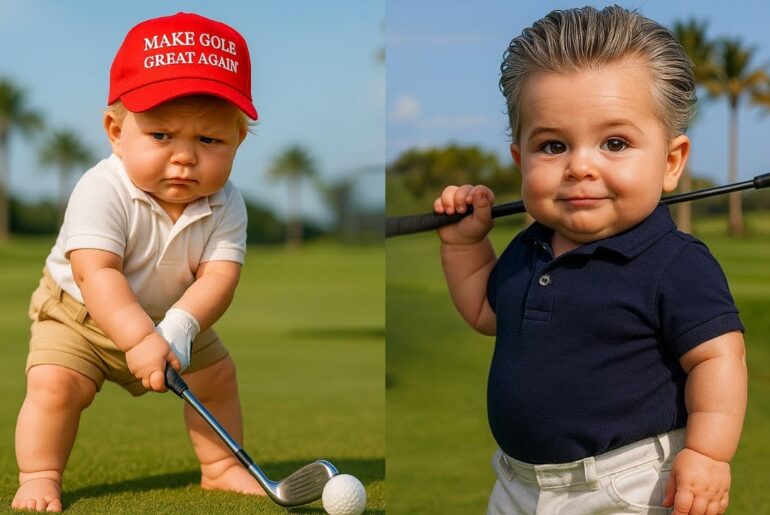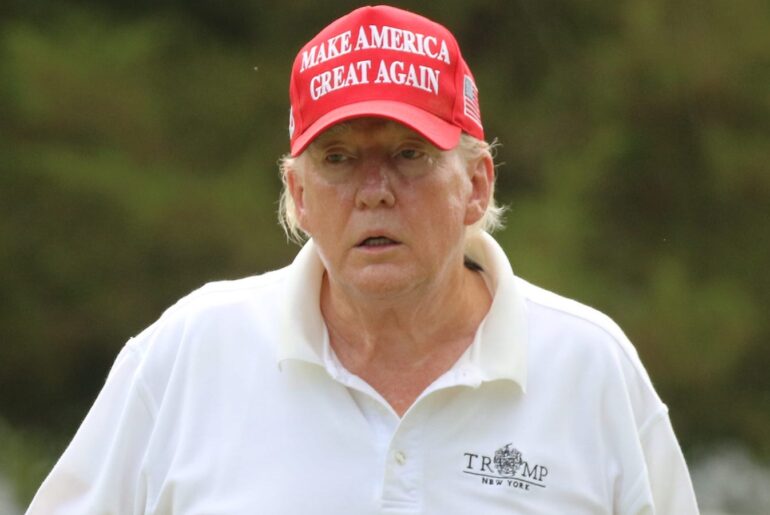NEW YORK — Dana White squeezed in a recent workout in New York — ahead of the launch of his new boxing promotion, just after he struck a YouTube deal for Power Slap, days ahead of the next major UFC pay-per-view card and around the time he celebrated making the cover of Forbes — when his phone buzzed in the gym from one of his closest confidants, the president.
Hours before President Donald Trump addressed Congress, he texted White congratulations on becoming the latest cover boy for the business magazine that labeled the UFC CEO the “Populist Capitalist.”
Their relationship dates to UFC’s infancy in White’s reign as he reorganized the company and led its rise into national prominence. Their alliance has yielded dividends for both parties — White stumped for Trump at Republican conventions while men who soak up fight nights threw their support behind Trump in the elections. It’s that kinship that prompted Trump to text White after the cover was released and even take Forbes to task for publishing the president’s name in the sub-headline.
People are also reading…
“You deserve the cover without having absolutely nothing to do with Trump,” White said, as he read the text exchange to The Associated Press. “I shouldn’t even be mentioned in the scheme of your tremendous success, so much as mentioned.”
President Donald Trump talks with UFC CEO Dana White at an election night watch party on Nov. 26, 2024, at the Palm Beach Convention Center in West Palm Beach, Fla.
Evan Vucci, Associated Press
Maybe, but perhaps it’s telling that Trump’s rise politically mirrors that of UFC’s ascendance under White, two men whose style has served as a siren song for a segment of the population yearning for a return to the so-called traditional definition of a virile man, not just in the ring, but in life.
Kyle Kusz, a University of Rhode Island professor and author of “Revolt of the White Athlete: Race, Media and the Emergence of Extreme Athletes in America,” said Trump smartly latched onto UFC because White has posited the company as a safe space for “manly men.”
“It kind of embodies the brutal, fight-to-the-finish way of being a man,” Kusz said. “It seems open to all sorts of men across different social categories, whether that’s class, whether that’s ethnicity, whether that’s race. It’s also open to women who are willing to be all-in on that way of thinking. Trump is cultivating that way of being to essentially train the population to fight for his reign.”
White was grateful in his text reply to Trump, writing, “When they mention tribal business model, it’s really about loyalty and friendship, which is something people these days know nothing about. You and I are the poster boys for loyalty. Thank you for the kind words, Mr. President. But I have no problem being mentioned with you in any shape or form.”
Yes, that’s right, White calls his long-time friend and former business associate from the days when Boardwalk cards at Trump Taj Mahal lifted UFC into relevancy, Mr. President.
“I called him Don before he became President,” White said, laughing. “Now that he became President, I call him Mr. President.”
Now, White, already the king of combat sports, may soon be called the final boss in boxing.
TKO Group, the company that already houses WWE and UFC, entered into a partnership with Saudi Arabian businessmen to form the new, yet unnamed boxing venture that could provide the jolt of cash, infrastructure, and organized leadership the sport needs. TKO will serve as managing partner and run the day-to-day operations of the promotion expected to run its first card next year, but details are scarce beyond the initial announcement.
Dana White watches as President Donald Trump speaks at an election night watch party on Nov. 6, 2024 at the Palm Beach Convention Center in West Palm Beach, Fla.
Evan Vucci, Associated Press
The league needs a name — TKO is literally the low-hanging fruit there for the taking — a roster and a rights deal.
Given the business acumen of the parties involved, and the hefty Saudi bankroll, those issues seem easily solvable and White’s input might be enough to prop boxing out of its niche status and into a mainstream sports player. Boxing retreated from the public sports consciousness in part because White and UFC exploited its inherent messiness to create a more coherent fight organization.
It was WWE president and TKO board member Nick Khan who introduced White to Turki Alalshikh, chairman of the Saudi General Entertainment Authority, about 18 months ago to discuss collaborating on a boxing league. White had toyed with the idea of starting a boxing promotion and trying to fix a sport many believe long broken because of everything from corruption to decaying interest in the United States to the alphabet soup sanctioning bodies refusing to play nice and book the best fights.
The 55-year-old White hit it off with Alalshikh and Saudi Arabia was eager to add to its sports portfolio.
The Saudis host a Formula 1 auto race, fund LIV Golf, have hosted numerous pay-per-view boxing cards — topped by Tyson Fury’s win over Francis Ngannou in October 2023 — are in the midst of a 10-year deal to hold WWE events and will host the 2034 World Cup in men’s soccer, giving the oil-rich kingdom its biggest prize yet in its sports expansion.
Each marquee event only seems to push accusations against Saudi Arabia of “sportswashing,” an effort to rebrand a nation’s troubling public image that has been going on for decades, using the Olympics and other sports across the globe, further into the background. Endeavor (the majority owner of TKO) and CEO Ari Emanuel returned a $400 million investment from the kingdom’s sovereign wealth fund in 2019 after the murder of journalist Jamal Khashoggi.
Now, TKO is working with, among others, Sela, a subsidiary of Saudi Arabia’s Public Investment Fund. The Saudis will fund the league, while TKO will run it.
“So far, it’s been a great relationship,” White said. “I have to be aligned. I have to feel good about the relationship and these guys have kept their world and did everything they said they would do. Anything that happened with Saudi, pre-my deal, I didn’t have a relationship, I wasn’t with them.”
White and TKO have the tools to turn the company into a winner.
White — whom Forbes estimated to have a personal net worth north of $600 million — has cashed in on the current political climate and an audience that embraces the extreme no-excuses ideological masculinity that ushered Trump into the White House. Trump has leaned on UFC fights as both testosterone-charged campaign rallies and election celebrations and White and his fighters have come along for the ride.
“A lot of the ways in which Trump wants to change culture, and to win at politics, he can express through connecting himself through sport, like UFC, because it does kind of promote manly man who are willing to be strong, be aggressive who are willing to fight for their side,” Kusz said.
Much like loyalists seemed to tune out impeachment charges against Trump or even his conviction on 34 felony counts in his historic hush money trial, the murky ethos of being bad has never been so good inside UFC. UFC fighters can seemingly act however they want and say whatever they want — see fighter Bryce Mitchell’s recent defense of Adolph Hitler or Conor McGregor’s order by a civil jury to pay $250,000 to a woman who says he raped her — without any significant consequence levied by the company.
“This is the fight business, man,” White said. “And then when you talk about races, religions, whatever you are, whoever you are, that’s what I’m selling. This is the fight business. At the end of the day, get over it. And if you can’t get over it, here’s my solution to you, don’t watch it.”
In American sports leagues, Mitchell and McGregor would have faced lengthy suspensions or more severe consequences for their actions, the kind of punishments White — who wouldn’t even sanction himself for an incident with his wife — no longer worries about dishing out.
“We went through that early on, figuring out where we fit, who we were and all that stuff. Not anymore,” he said. “This is the fight business. People are going to say some stupid (stuff). People that you won’t necessarily agree with. Some bad thing will break out in their part of the world, and you hold all of them accountable for it and they can’t make a living? That’s never going to be us while I’m here. After I’m gone, I can’t tell you what’s going to happen.”
And how long does White plan to keep running his mixed martial arts empire?
“Until I die,” he said.
US presidents with the lowest golf handicaps
US presidents with the lowest golf handicaps
Golfing among U.S. presidents is culturally embedded in the job—even if you come into the White House as a casual player. It’s seen as a stress reliever for one of the toughest jobs in the world.
One of the first presidents to take up a club was William Howard Taft, who served from 1909 to 1913. Taft loved golf, so much so that it garnered him detractors during his 1908 presidential campaign for playing a “rich man’s game.”
But Taft isn’t the only president with an ardent love for the game. Throughout U.S. history, many of the country’s leaders have used the fairway as a place to relax and occasionally engage in important conversations. “It’s good exercise, but there’s also the chance for dialogue with people in politics,” Mike Trostel, former historian for the United States Golf Association, told CNN. Woodrow Wilson, Dwight Eisenhower, and John F. Kennedy are among the list of U.S. presidents who enjoyed a round of golf. But which one had the best game?
PrimePutt compiled a ranking of the five U.S. presidents with the lowest golf handicaps using data from Southern California Golf Association.
Despite its place in the nation’s highest office, the sport is not without its issues. The exclusivity of the suburban country club and plush hilly greens are what you’d find in a wealthy multimillion-dollar neighborhood, which is not what the average American has access to.
Even with diverse breakthrough talents like Tiger Woods and presidents like Barack Obama seen on the greens, the sport is still seen and is largely represented by wealthy white men. According to the USGA, in 2019, when Woods secured his 15th major championship, African Americans made up only 3% of the country’s golfers.
While the sport continues to struggle with that legacy of privilege, the green still maintains in place in politics. Read on to find out which president can boast of the lowest handicap.
![]()
Photo Illustration by Elizabeth Ciano // Stacker // Getty Images
#5. George H.W. Bush
– Handicap: 11
Before entering politics, George H.W. Bush was raised in a wealthy part of Massachusetts, where country clubs and golf courses were nearby and plentiful. On the greens, Bush was known for his fast playing style and notably could finish an 18-hole course in an hour and 20 minutes. And he wasn’t the only one in his family who was known to be efficient on the greens.
Bush’s father and grandfather were also presidents of the United States Golf Association. What’s more, his son, President George W. Bush, was also an avid golfer; however, two years into his presidency, the demands of the Iraq War put his golf hobby on the back burner.
Bush Sr. was later inducted into the World Golf Hall of Fame in 2011.
Brooks Kraft/CORBIS/Corbis via Getty Images
#3. John F. Kennedy
– Handicap: 7
The Kennedy family was a local political dynasty in Massachusetts before the birth of John F. Kennedy and his siblings.
While in the White House, Kennedy became an avid golfer, but he hid it from the media. He regularly golfed with his press secretary Pierre Salinger, brother-in-law Peter Lawford, and then-ABC News national affairs editor Bill Lawrence.
Similar to George H.W. Bush, Kennedy was a fast-paced golfer known for his speed of play. According to former PGA president Max Elbin’s son, Kelly, Kennedy was an athletic golfer jumping from one tee to the next in no particular order.
Bettmann // Getty Images
#2. Joe Biden
– Handicap: 6.7
An outlier among this list, Joe Biden grew up in a family that experienced financial ups and downs, and he didn’t start playing the sport until 2001.
However, golf has been a part of Biden’s routine throughout his time in the White House, as both president and vice president. He is also a member of two country clubs in Delaware. His game was a subject of national scrutiny when it came up in a presidential debate during the 2024 campaign.
Antonio Masiello // Getty Images
#1. Donald Trump
– Handicap: 2.8
Named “golfer-in-chief” by Golf Digest, Donald Trump began playing while at Wharton School of Finance. “I played golf with my friends, and then I started to play with the hustlers. And I learned a lot. I learned about golf, I learned about gambling. I learned about everything,” Trump told Golf Digest.
Throughout his presidency, he routinely played golf. During his first term, he spent almost 307 days at the sport. He has played rounds with former Japanese Prime Minister Shinzo Abe, actor Samuel L. Jackson, and boxer Oscar de la Hoya. The latter two, however, have raised questions about the quality of Trump’s game.
Currently, Trump Golf manages 18 courses worldwide.
Data reporting by Karim Noorani. Story editing by Carren Jao. Additional editing by Kelly Glass. Copy editing by Tim Bruns.
This story originally appeared on PrimePutt and was produced and distributed in partnership with Stacker Studio.
Robert Perry // Getty Images
Get in the game with our Prep Sports Newsletter
Sent weekly directly to your inbox!

